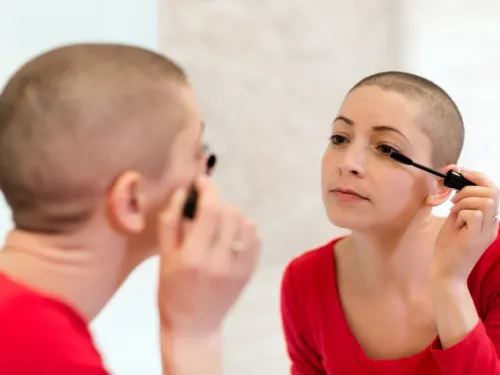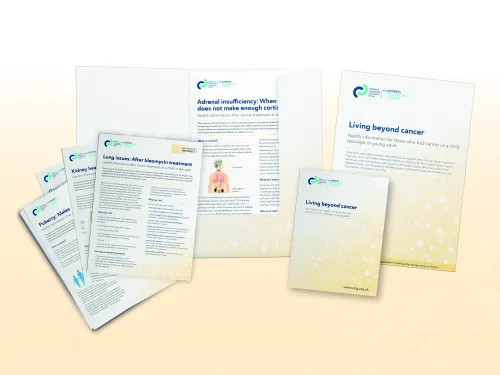By being aware of potential health risks, you have the chance to possibly reduce their impact by changing your lifestyle such as ensuring you eat healthily, take regular exercise and reduce stress levels.
The following are some common lifestyle questions.
It’s well known that exposure to the sun can cause skin cancer. Some survivors of childhood cancer may be at risk of second cancers which includes skin cancer. In order to minimise the risk of skin cancer it is essential to wear sunscreen. This should be a high factor. Don’t ever be tempted to use a sunbed! They use very intense rays, which are especially damaging.
Finally, check your skin for moles. If a mole changes shape, size or colour, bleeds or itches, you need to see your GP.
Not usually. If you feel more tired than your friends doing the same activities, you should mention it at your clinic visit. Your doctor may suggest you need a blood test to check if you have a hormone imbalance. This is not very common.
Smoking has been clearly linked with cancer. It has been known since the 1950s that it causes lung cancer, as well as cancer of the mouth, throat and bladder. It is not a good idea for anyone to smoke. Some cancer treatments can increase the risk of a second cancer. You may be even more at risk if you smoke. The risk is especially high if you had radiotherapy to your chest and lungs
Some people do have problems with their memory after treatment but this is not common. Late effects are very dependent on the type of cancer you had and how you were treated. As always, if you have particular concerns discuss them with your doctor at the clinic. Attending the follow-up clinic will help to ensure that any problems are detected early as well as giving you the opportunity to raise any worries you have about your health
Sports and exercise is important for improving muscle strength, contributing to a sense of well being and enhancing self-confidence. Exercise programmes can also reduce the tiredness and lethargy that some patients experience following treatment. Belonging to a team and incorporating exercise in your life can help you feel more independent.
Exercise combined with healthy eating can also prevent obesity. This is extremely important because obesity can lead to a number of other health problems like high blood pressure and heart disease.
For many people who had cancer, there is no problem at all about taking strenuous exercise. In fact, most people are encouraged to take exercise. It helps to keep you fit and can be fun, especially if you exercise with friends.
Some people need to be careful, if they were treated with certain drugs. These drugs (anthracyclines) are very good at treating cancer cells but they can occasionally damage healthy heart muscle. If you routinely have heart scans (echocardiograms) you should ask your doctor about doing strenuous exercise, such as weight lifting.
If you want to take up sports such as diving, you will need to undergo a medical. There are certain situations where diving would be considered unsafe, e.g. following some chest surgery but there is a medical panel to consult about specific medical issues available through the British Sub Aqua Club (BSAC). Their website gives lots of information about being medically fit to dive www.bsac.com
You may have been left with some scars after your treatment; you may feel your hair is thinner or different from before. Sometimes scars can be removed by plastic surgery; you can discuss this at the clinic. If your hair is thinner it is very important to check you are eating a good balanced diet and make sure you have enough B vitamins and are not anaemic. It is also important to check your hormone levels as both your thyroid and sex hormone levels have an effect on your hair growth.
Most young adults don’t worry about things like cancer or heart problems. However, it is natural for survivors to be fearful about the possibility of a relapse or late effects. These worries can make you feel different from your friends. However, the chance of getting a second cancer is very small.
It is important to find out as much as possible about cancer and its treatment so there are on-going research studies investigating children who are newly diagnosed and young people that have been treated previously. For this reason you may be asked to take part in a study looking at the effects of some aspect of your disease and treatment at any time.
Your follow-up team will be able to tell you if there are any long-term follow-up studies relevant to you currently being carried out. Your doctor will explain the study to you and you will need to sign a consent form to participate. Certain studies provide essential information on a variety of problems that may arise, the risk factors for developing problems and in some cases the effects of different treatments. This research enables doctors to help current and future generations of patients.
Currently, people who have had cancer are not able to donate blood. Rules about blood donation do change so it is worth checking here www.blood.co.uk
Organ donation is possible for some people who have been treated for cancer. For further information visit www.organdonation.nhs.uk
Follow up and future care
Cancer is treated in different ways and sometimes the treatments can cause long-term problems.

Late effects
All cancer treatments are different and affect people in different ways. Most people have some side effects during treatment. But some people also have late effects of treatment.

Life after childhood cancer - what issues do survivors have to manage?
Cancer doesn't end when you finish treatment. Even after the cancer cells are long dead, the long-term effects of childhood cancer and its treatment remain. So, what are they?

Living beyond cancer information pack
Our 'Living beyond cancer' information pack has been written for you by clinical experts to help you live a healthy life after having cancer as a child, teenager or young adult.
